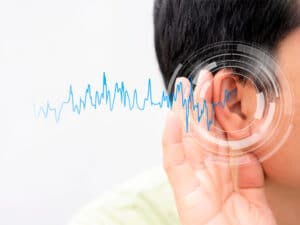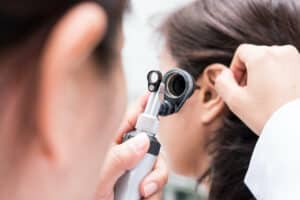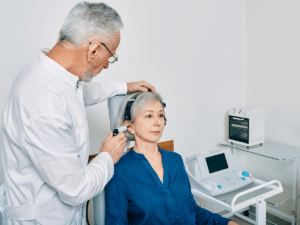In our daily lives, we rely on our senses to navigate the world and interact with others. So, if there are signs that one of them is missing, it’s easy to get terrified. “Am I going deaf?” is a common question for many people who are experiencing unusual hearing problems.
Hearing loss can come on suddenly or slowly, and it can range from mild to severe. But not all signs lead to going deaf—in fact, many of them can be treated or reversed. It’s important to pay attention to any changes in your hearing and consult a doctor if they persist.
Nonetheless, getting some knowledge about what you’re currently experiencing is a helpful first step! In this blog, our audiologist in Westchester aims to help you understand the signs and symptoms of hearing loss and provide resources on how to find a solution.

Causes of Deafness
Deafness, as defined by the World Health Organization, is any degree of hearing loss that makes it hard to understand speech. There are a variety of factors that may cause a person to lose their hearing partially or completely. Here are some of the most common ones.
Temporary Hearing Loss Causes
1. Ear Wax Buildup
Our ears secrete cerumen, a natural lubricant, to clean and protect our ear canals. Sometimes this ear wax accumulates, leading to temporary hearing problems. This is a common cause of hearing loss in one ear but can also be a sign of a more serious condition.
2. Foreign Object
It may sound silly, but it is possible for a foreign object to get stuck in your ear canal—like a small toy or even an insect. This can lead to hearing loss in the affected ear, as well as ringing or buzzing sounds. If you suspect you have a foreign object in your ear, it’s important to get it checked out by a doctor.
3. Excess Mucus
Mucus is a normal part of the ear’s self-cleaning process, but too much mucus can also lead to hearing problems. Excess mucus can block the ear canal and cause temporary hearing loss. This may happen when you are experiencing a common cold, flu, hay fever, or other allergies.
4. Ear Infections
Ear infections such as otitis externa (infection of the outer ear) and otitis media (infection of the middle ear) may cause temporary hearing loss. It’s important to see a doctor if you suspect your hearing problems are caused by an infection, as antibiotics may be necessary to clear it up. If left untreated, these infections can lead to permanent damage and hearing loss.
Other Hearing Loss Causes (That Can Lead to Deafness)
1. Hereditary Disorders
Parents with a hearing loss history can pass affected genes down to their children. Some hereditary disorders, such as otosclerosis and Usher syndrome, may lead to going deaf if not treated. In most cases, these problems are due to malformations in the inner ear and can be treated with surgery or hearing aids.
2. Genetic Disorders & Prenatal Exposure to Disease
Genetic mutations can take place during pregnancy or at any point in a person’s life and can cause permanent hearing loss. These mutations are often beyond an individual’s control, but they can still be managed with the help of hearing aids or cochlear implants. On the other hand, prenatal exposure to diseases such as German measles, mumps, and rubella can lead to the child’s deafness if the mother contracts them during pregnancy.
3. Exposure to Loud Noises
Long-term exposure to loud noises (86 dB+) can cause hearing damage over time. This is true for frequent listening to loud music, going to concerts without ear protection, using power tools and machinery at work, and going hunting without ear protectors.
4. Age-Related Hearing Loss
This is a natural part of the aging process but can still lead to going deaf. Age-related hearing loss, or presbycusis, can start in the 40s and worsen over time. The best way to prevent going deaf due to age is by treating it early and using hearing aids as soon as possible.
5. Trauma or Disease
Traumatic injuries, head trauma, certain diseases (meningitis and meningococcal disease), and even medications can lead to going deaf. If going deaf is due to one of these factors, the hearing loss may be temporary or permanent. It’s important to visit a doctor if going deaf may be due to trauma or disease.
Signs You Are Going Deaf
1. Trouble Following Conversations
If you’re used to easily following conversations, especially in crowded and noisy places, going deaf can present itself through the difficulty of doing so. If you find yourself making errors in conversations due to not hearing correctly, it may be a symptom of hearing loss.
2. Hearing Mumbling Sounds Instead of Speech
You may get irritated at others because you hear them mumbling instead of speaking clearly. This happens when you can hear vowels but not consonants, making it difficult to understand what is being said. If this happens often, it may be a sign of going deaf.
3. Extra Loud Volume
Do people always tell you to turn the TV volume down? If you are showing signs of hearing loss, you may find yourself needing to turn the volume up more and more. This is a sign that your hearing ability is diminishing, and you should get a hearing checkup.
4. Sound Volume Imbalance
Have you felt like some loud sounds startle you more than they used to? One of the signs of hearing loss is a phenomenon called “recruitment,” which happens when you don’t lose your ear’s hair cells at the same time. When one sound is loud for you, it may trigger the healthy cells and respond more forcefully than they normally would.
5. Effect on Your Balance
If you’re experiencing vertigo and dizziness, it may be caused by something other than your ears. However, if your balance problems are accompanied by a hearing issue, it may indicate hearing loss. Your balance mechanism is closely related to your ears, so hearing loss, especially in one ear only, can affect it.
6. Difficulty Carrying Conversations in Crowds
Background noise and multiple people talking can become overwhelming if you have hearing problems. If other people seem to understand each other in a crowded place, but you don’t, it may be a sign of hearing loss.
7. Misunderstanding Speech Over the Phone
Hearing on the phone can be more difficult than in person. If you are having trouble understanding conversations over the phone, this may be a sign of hearing loss. This is especially the case if you put it in the ear that has a hearing problem.
Hard of Hearing vs. Going Deaf
Hearing loss is a spectrum. Many people may experience some hearing loss that is small enough to not be considered deafness or hard of hearing. Nevertheless, the difference between these two is the degree of hearing loss. These levels are grouped into mild, moderate, severe, and profound.
When the hearing loss is profound, or a person has very little hearing or none at all, they are considered deaf. Hearing Aids in Westchester can often help the hard of hearing, while those who are deaf may only benefit from implants, lip reading, sign language, and other assistive technologies.
Get a Hearing Test & Consult an Audiologist

The best way to know if you are going deaf is to have a hearing test with an audiologist. The audiologist will look at the results of the hearing test and determine if you are showing signs of hearing loss. They can also recommend strategies to protect your remaining hearing and assistive technologies that may help you.
Listen Hear Diagnostics is the leading hearing specialist and audiologist in Westchester, NY. We provide trusted hearing loss treatment and customized hearing aids. Contact us today to book a hearing test and consultation. Our experienced team of audiologists will be more than happy to assist you!








